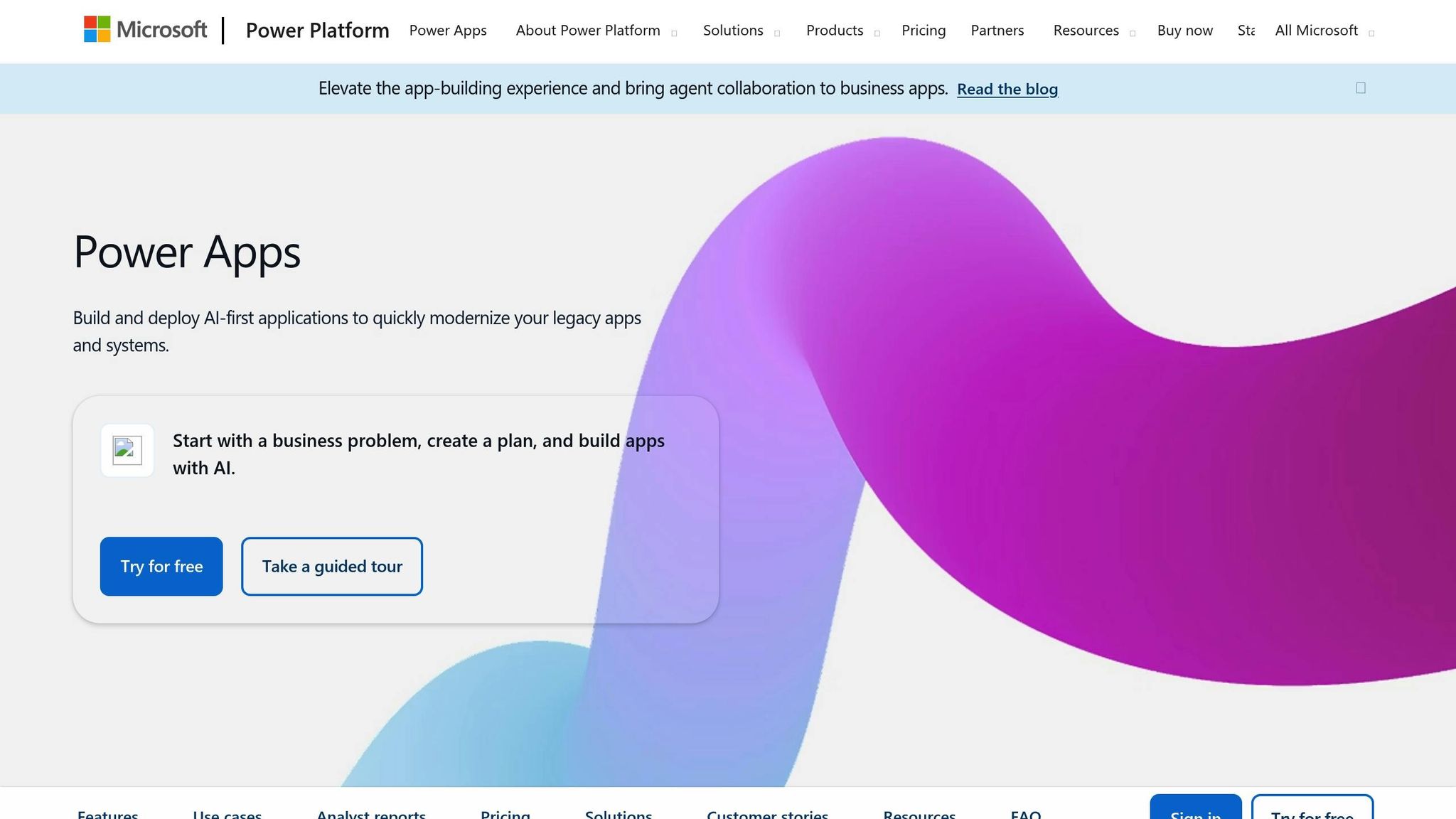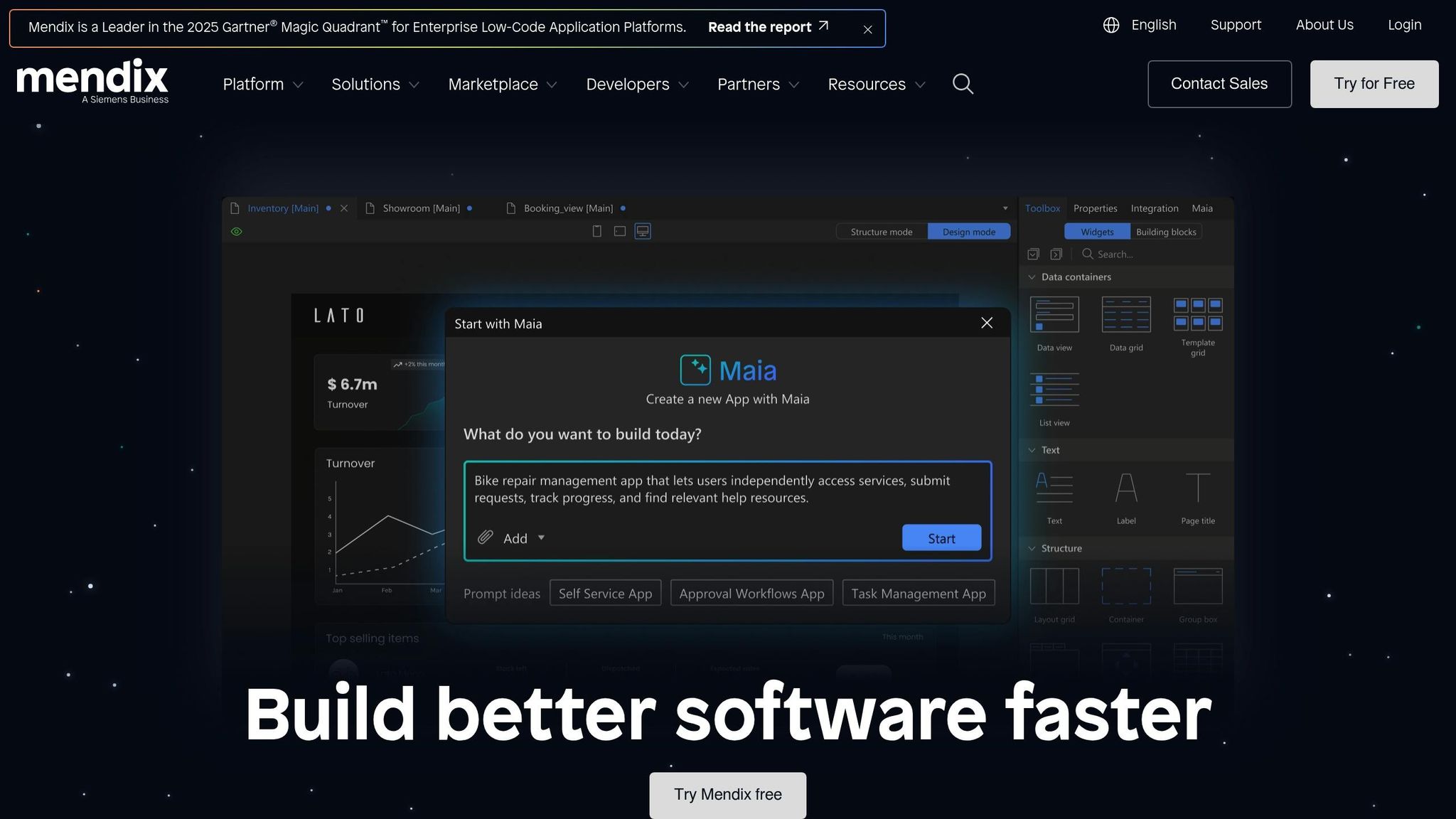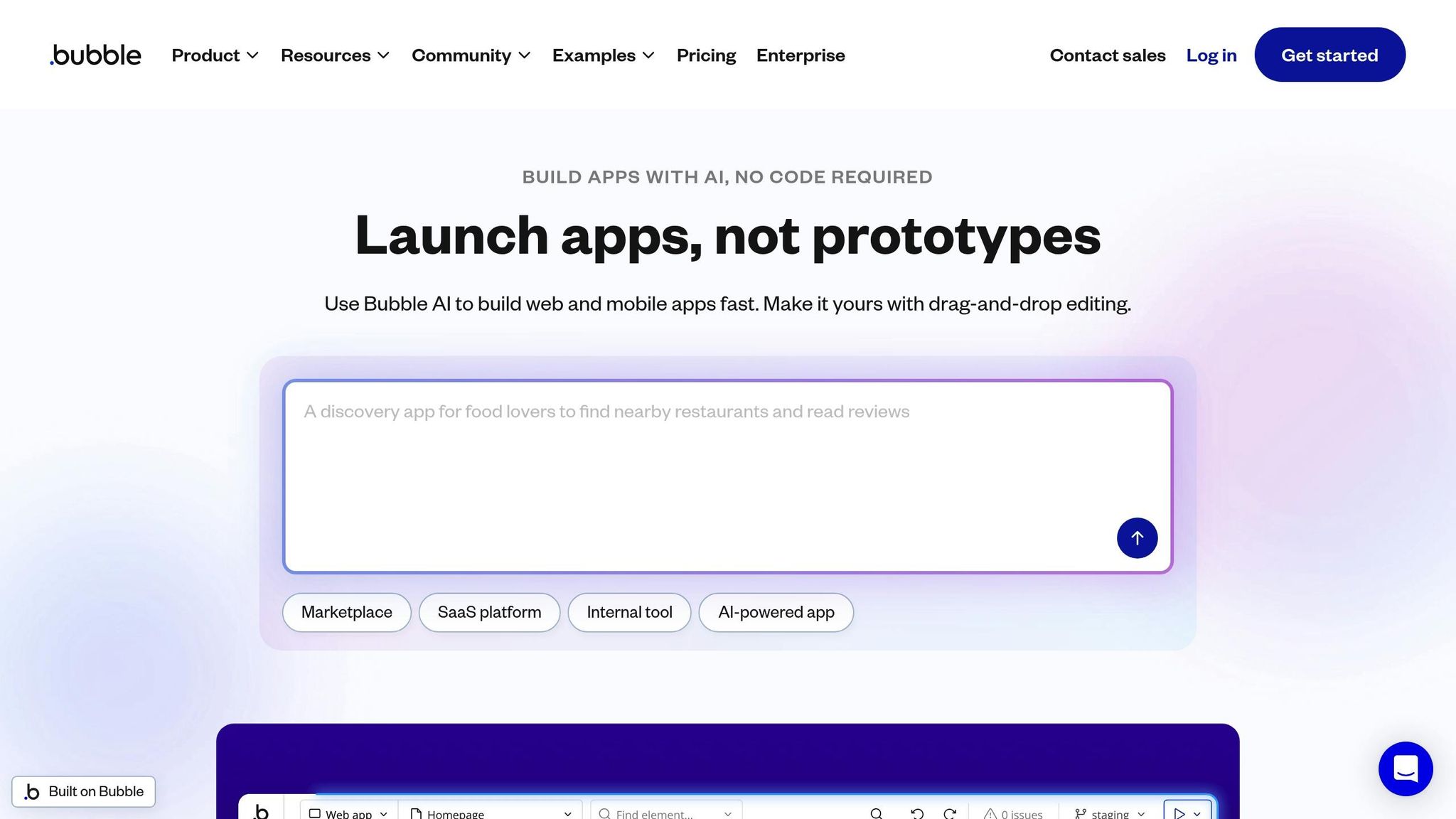Low-code automation is transforming IT consulting in the U.S., enabling firms to deliver faster, cost-effective solutions without extensive coding. Platforms like Microsoft Power Apps, Mendix, and Bubble allow consultants to build apps visually, integrate with existing systems, and scale for enterprise needs. Here's a quick breakdown:
- Microsoft Power Apps: Ideal for businesses using the Microsoft ecosystem. It offers seamless integration, AI tools, and scalability with pricing starting at $5/user/month.
- Mendix: Best for complex, enterprise-level apps with advanced workflows and collaboration tools. It supports hybrid development but comes with higher costs.
- Bubble: Perfect for startups and rapid prototyping, offering a drag-and-drop interface and real-time capabilities. However, it has limitations with high-traffic apps.
Each platform suits different project needs, with trade-offs in customization, scalability, and costs. For added expertise, consulting firms listed in the Top Consulting Firms Directory can guide businesses through implementation and integration challenges.
My BEST tips for Beginners in Low Code Automation | Sonorus Consulting
1. Microsoft Power Apps

Microsoft Power Apps has become a go-to low-code platform for IT consulting firms across the United States. Built on Microsoft's cloud infrastructure, it provides a visual development environment that simplifies the creation of custom business applications. With its drag-and-drop interface, consultants can quickly prototype and deploy solutions, making it a perfect fit for tight project timelines.
Capabilities for IT Consulting
Power Apps is especially adept at building data-driven applications that integrate seamlessly with various data sources. Consulting firms can design CRM systems, inventory management tools, onboarding workflows, or reporting dashboards in a matter of weeks. The platform offers two main app types: canvas apps, which provide full creative control over the design, and model-driven apps, which take a more structured, data-focused approach.
The platform's AI Builder feature adds a powerful dimension for IT consultants. It enables them to integrate AI capabilities - like form processing, object detection, and predictive analytics - without requiring expertise in machine learning. For instance, consultants can develop apps that automatically extract expense details from receipts or quality control tools that identify manufacturing defects.
Another standout feature is its offline functionality, which is crucial for industries like construction, field services, or retail. Apps can operate without an internet connection and sync data once connectivity is restored, ensuring smooth operations under any conditions. These features make Power Apps a practical choice for a wide range of business needs.
Integration with Existing Systems
One of Power Apps' greatest strengths is its seamless integration with the Microsoft ecosystem. For clients already using tools like Office 365, SharePoint, or Dynamics 365, Power Apps connects effortlessly, eliminating the need for complicated API setups or middleware. Additionally, it supports over 400 third-party services.
The platform works well with SQL Server databases, Salesforce, Oracle systems, SAP, and even cloud services like Amazon Web Services or Google Cloud Platform. For proprietary systems, custom connectors can be built, giving consulting firms the flexibility to adapt to any client infrastructure. This ease of integration reduces project complexity and avoids unnecessary data migrations or system overhauls.
Power Apps also utilizes Microsoft Dataverse, a secure, cloud-based data platform that acts as a unified data layer for applications. This is especially useful for firms that need to access and consolidate data from multiple client systems while maintaining high security and integrity standards. Such integration ensures smoother workflows and supports scalability.
Scalability for US Businesses
Thanks to its built-in data architecture and Microsoft Azure's infrastructure, Power Apps can scale effortlessly to meet the needs of businesses, whether they have dozens or thousands of users. Azure handles scaling, load balancing, and performance optimization automatically, so firms don’t have to worry about backend complexities.
For enterprise clients, Power Apps integrates with Azure Active Directory, enabling secure user authentication and role-based access control. This ensures that applications can grow alongside a client’s business while remaining secure and compliant. Additionally, the platform supports multi-environment setups, allowing firms to maintain separate development, testing, and production environments.
The per-user licensing model makes scaling straightforward. As businesses grow, consulting firms can offer predictable pricing structures to clients. Applications can also be embedded into existing business processes or websites, offering flexibility in how solutions are delivered and accessed.
Cost in USD
Power Apps follows a subscription-based pricing model with options to suit different needs. The per-user plan costs $20.00 per user per month and includes access to all Power Apps features and premium connectors. For lighter usage, the per-app plan costs $5.00 per user per month, allowing access to specific applications.
For development and prototyping, the free Power Platform Developer Plan is available, enabling firms to build and test applications without any initial investment. This is particularly helpful for showcasing solutions to clients before committing to full-scale development.
For larger enterprise deployments, Microsoft offers volume licensing discounts, significantly lowering per-user costs. Many consulting firms bundle Power Apps licensing into their support agreements, creating recurring revenue streams while providing clients with predictable monthly expenses. When factoring in reduced development time, lower maintenance needs, and minimal infrastructure management, the total cost of ownership often comes out ahead compared to traditional custom development.
2. Mendix

Mendix is a low-code platform designed to help IT consulting firms create enterprise-level applications efficiently. Unlike basic low-code tools, Mendix combines visual modeling with traditional coding, offering a full-stack development environment. This hybrid approach is particularly appealing for consulting firms working with large enterprises that need scalable and complex solutions.
Capabilities for IT Consulting
Mendix stands out when it comes to building intricate business applications that simpler low-code platforms might struggle with. It uses a model-driven development process, where consultants design applications using visual flowcharts that automatically generate code. This method ensures both speed and reliability.
Another highlight is its multi-experience development capability. From a single codebase, consultants can create applications for web, mobile, and progressive web apps. This unified approach not only saves time but also simplifies ongoing maintenance for clients who need to engage users across multiple platforms.
The platform also promotes teamwork with its collaborative development environment. Features like built-in version control and conflict resolution allow consulting teams to work together seamlessly, keeping all stakeholders on the same page.
For firms dealing with data-heavy applications, Mendix offers advanced data modeling tools. These tools handle complex relationships, business rules, and workflows with ease. Whether it’s basic CRUD operations or intricate business logic involving multiple data sources, Mendix is equipped to manage the complexity, making system integration smoother.
Integration with Existing Systems
Mendix excels in integrating with enterprise systems, offering pre-built connectors for platforms like SAP, Salesforce, Oracle, and IBM mainframes. It also supports REST and SOAP web services, enabling smooth communication with any API-enabled system. These ready-made connectors help reduce the time and effort typically required for custom integrations.
For older systems without modern APIs, Mendix provides database connectors and file-based integration options. This flexibility allows consulting firms to work effectively regardless of the client’s technology stack.
The Mendix Data Hub serves as a centralized catalog for an organization’s data sources, making it easier for consulting teams to discover and reuse data assets. This feature is particularly valuable for large enterprises with complex data environments, as it helps eliminate data silos and ensures consistency across applications.
For applications requiring real-time responses, Mendix supports message queues and event-driven architectures. This capability is essential for systems like inventory management or customer service, where immediate updates are critical.
Scalability for US Businesses
Mendix applications are designed to scale, whether they’re small departmental tools or enterprise-wide systems serving thousands of users. The platform runs on cloud infrastructure that automatically manages scaling, load balancing, and performance optimization. For consulting firms in the US, deployment options on Amazon Web Services, Microsoft Azure, and IBM Cloud ensure compliance with data residency regulations.
The platform’s microservices architecture allows individual components of an application to scale independently based on demand. This is especially useful for applications with fluctuating usage patterns, as it ensures resources are used efficiently without compromising performance.
Mendix also offers strong security features, including single sign-on integration, role-based access control, and compliance with standards like SOC 2, ISO 27001, and GDPR. These features are critical for consulting firms working with regulated industries like healthcare and finance. Additionally, its support for multi-tenant architectures allows firms to create applications that serve multiple clients or business units while maintaining data separation and customization.
Cost in USD
Mendix uses a user-based pricing model that adjusts with application usage, offering various tiers to suit different business needs. There’s also a free tier available for development and testing, which allows consulting firms to prototype solutions without upfront costs. Larger firms often negotiate custom pricing based on project scale. Many consulting firms find that the time saved in development and reduced maintenance costs make the investment worthwhile.
3. Bubble

Bubble takes low-code development to a new level with its drag-and-drop interface and visual programming tools. This setup allows for quick prototyping and smooth teamwork, perfectly aligning with the fast-paced, efficiency-focused strategies often employed by IT consulting firms. By enabling teams with limited coding expertise to build applications, Bubble makes development accessible and collaborative. Instead of relying on traditional coding methods, consultants use Bubble's visual workflows to design both the user interface and the application's logic. This approach is especially appealing for firms that need to create prototypes quickly or involve clients directly in the development process.
Capabilities for IT Consulting
With Bubble's visual development platform, consulting teams can design web applications by creating pages, setting up workflows, and managing data - all through an intuitive interface. Everything from the user interface to backend logic is handled within one unified environment, making it easy to produce fully functional web apps. These applications can include customer-facing tools like dashboards, portals, and workflow systems. Plus, Bubble's responsive design ensures that the apps work seamlessly on both desktop and mobile devices, a must-have for modern business needs.
Another standout feature is Bubble's real-time functionality, which allows for instant data updates and user interactions. For IT consulting firms, the platform's collaborative tools are a huge plus. Multiple team members can work on a project simultaneously, and built-in version control makes it easy to track changes - perfect for making quick adjustments based on client feedback. Beyond building the apps themselves, Bubble's ability to integrate with existing systems adds another layer of functionality.
Integration with Existing Systems
Bubble excels at tackling integration challenges. Its API Connector Plugin enables apps built on the platform to connect with nearly any external service that offers an API, ensuring smooth communication with enterprise systems.
"Bubble.io provides users with the ability to connect their app with popular services and platforms, such as Zapier, Stripe, and Salesforce. This feature makes it easy to integrate your app with other tools and services, which can help you streamline your workflow and improve productivity." - Nymbl
The Plugin Marketplace offers pre-built integrations for services like analytics and marketing, extending app capabilities without requiring custom coding. For authentication, Bubble supports OAuth2 and social logins through platforms like Google and Facebook, simplifying user management for consulting clients.
Bubble's collaboration with Workato further expands its integration potential, offering access to over 8,500 pre-built connectors. For example, Bubble® PPM uses Workato to connect with third-party tools like Outlook, Salesforce, Jira, SAP, PowerBI, and Microsoft Dynamics.
A real-world example of Bubble's integration power comes from Athena, a company based in San Juan, Puerto Rico. Athena used Bubble to create a custom HRIS that manages over 1,500 global employees. This system integrates seamlessly with other Bubble-built apps to track employee laptops, handle time-off requests, and maintain organizational charts.
Scalability for US Businesses
Bubble's integration capabilities are complemented by its cloud infrastructure, which automatically manages scaling, load balancing, and performance optimization. This makes it ideal for businesses that need their applications to grow alongside their operations. For instance, Seagate uses Bubble for both internal and customer-facing applications, including device provisioning and subscription management. Similarly, Unity's SuperSonic team utilized Bubble to create a knowledge hub for game developers, showcasing its ability to handle enterprise-scale projects.
Another example is Playground IEP, an education management system developed by special educator Sean Klamm. This platform integrates with school systems to automate IEP scheduling, generate detailed reports, and provide teacher dashboards for monitoring student progress. It’s a testament to how Bubble can scale to meet the needs of specialized environments.
Cost in USD
Bubble also stands out for its cost efficiency in complex projects. Take Athena's custom HRIS as an example: it costs around $100,000 per year to develop and maintain on Bubble. Compare that to the estimated $2,000,000 it would take to build a traditional ERP system, and you’re looking at a 95% cost reduction.
4. Top Consulting Firms Directory
The Top Consulting Firms Directory is a go-to resource for organizations seeking IT consulting expertise in low-code automation. This directory connects businesses with consultants who blend technical know-how with a deep understanding of business needs, addressing the rising demand for agile digital transformation strategies.
Expertise in IT Consulting
The firms listed in this directory specialize in essential areas like cloud services and data analytics, which are critical for successful low-code automation. They help businesses transition from traditional development methods while also offering guidance on cybersecurity and IT infrastructure to create secure development environments. These consultants are skilled in software and product development, helping organizations pinpoint automation opportunities and align low-code projects with broader business goals.
Seamless Integration with Legacy Systems
A key strength of these experts lies in their ability to address integration challenges. They assist businesses in connecting low-code applications with legacy systems and enterprise databases, ensuring a smooth and scalable integration process. This strategic support helps companies incorporate new applications into their existing systems without disrupting operations.
Scaling Low-Code Solutions for Growth
When it comes to scaling, these firms bring valuable expertise tailored to the needs of U.S. businesses. They focus on optimizing operations and developing strategies to expand low-code solutions from small-scale pilots to enterprise-wide initiatives. Their frameworks for governance and ongoing support ensure that automation efforts are not just scalable but also sustainable, driving both growth and operational efficiency.
The directory prioritizes consultants who can align low-code projects with tangible business outcomes. Whether it’s tracking ROI, streamlining processes, or improving customer experiences, these firms offer strategic insights that complement the technical capabilities of platforms like Microsoft Power Apps, Mendix, and Bubble.
Transparent Costs and Financial Guidance
Cost transparency is another highlight of the directory. These firms provide clear pricing models that help businesses budget effectively for low-code automation projects. Many also offer financial advisory services, giving companies a comprehensive view of the investment required for various platforms and implementation strategies.
Additionally, the directory features consultants with expertise in risk management and mergers & acquisitions. They provide insights into how low-code automation investments can influence company valuations and due diligence processes. This perspective is especially valuable for growing businesses looking to showcase technology investments or highlight asset value to potential investors.
sbb-itb-97f6a47
Advantages and Disadvantages
Choosing the right platform can be a game-changer for IT consulting firms, but each option comes with its own set of perks and challenges. Breaking down these trade-offs helps consultants match the best tools to their client’s specific needs and project goals.
| Platform/Resource | Advantages | Disadvantages |
|---|---|---|
| Microsoft Power Apps | Seamlessly integrates with Microsoft 365; familiar for Windows users; strong enterprise security; offers a wide range of templates; cost-efficient for those already using Microsoft licenses | Limited customization for complex apps; struggles with large datasets; advanced features require a steep learning curve; vendor lock-in risks; premium connectors need extra licensing |
| Mendix | Handles enterprise-level scalability with ease; advanced workflows; excellent version control and collaboration tools; strong testing environments; ideal for complex business apps | Higher costs; requires technical know-how for best results; longer implementation times; fewer third-party integrations; challenging for non-technical users to learn |
| Bubble | User-friendly visual programming; flexible design options; supportive community; budget-friendly for startups and smaller projects; great for rapid prototyping | Struggles with performance on complex apps; lacks robust enterprise security; scalability issues for high-traffic use; reliant on Bubble’s infrastructure; offline functionality is limited |
| Top Consulting Firms Directory | Access to seasoned experts; proven experience with enterprise projects; strategic insights beyond technical tasks; reduces risks with experienced professionals; comprehensive project support | Higher initial consulting fees; potential for extended timelines; reliance on external expertise; quality can vary across firms; adds coordination complexity |
When comparing these platforms, it’s clear that costs, technical demands, scalability, integration options, and learning curves differ significantly. For example, Power Apps strikes a balance between usability and functionality but can be restrictive for more intricate applications. Mendix delivers enterprise-level results but requires a deeper technical skill set and a longer setup process. Meanwhile, Bubble shines in accessibility and quick prototyping but may falter with complex requirements or large-scale deployments.
Integration capabilities are another key factor. Some platforms require more custom solutions to connect with other tools, while others offer smoother integration out of the box. The learning curve also varies depending on the user’s technical background and the platform's complexity. Additionally, vendor dependency plays a role, from Microsoft’s ecosystem lock-in to Bubble’s reliance on its infrastructure.
Bringing in expertise from the Top Consulting Firms Directory adds another layer of consideration. While these firms can extend project timelines and increase costs upfront, their involvement often reduces risks and improves the chances of long-term success. Their guidance is especially valuable for navigating complex implementations.
Ultimately, selecting the right platform means weighing these trade-offs against client priorities and the consulting team’s expertise.
Conclusion
Low-code automation platforms are reshaping the landscape of IT consulting in the United States, offering quicker project turnarounds and higher client satisfaction. Choosing the right platform - whether Microsoft Power Apps, Mendix, or Bubble - depends on your firm's client base, technical skillset, and the complexity of the projects you handle. This evolution highlights the importance of aligning platform capabilities with specific project requirements.
For consulting firms that primarily serve enterprise clients entrenched in Microsoft environments, Power Apps is often the most practical choice. Its seamless integration with Microsoft 365 and user-friendly interface streamline implementation, making it a great fit for mid-sized projects with moderate complexity.
When it comes to large-scale enterprise transformations requiring scalability and intricate workflows, Mendix shines. Although its higher costs and steeper learning curve might be a barrier for some, its advanced testing tools and version control features make it a powerful option for tackling complex business applications.
For startups and rapid prototyping needs, Bubble proves invaluable. Its visual programming approach enables consultants to quickly create and showcase concepts to clients. However, its performance limitations may make it less suitable for high-traffic, enterprise-level applications.
While each platform has its strengths, expert input often makes the difference in achieving successful outcomes. The Top Consulting Firms Directory, as discussed earlier, can be a crucial resource when your team lacks platform-specific expertise or when projects demand seasoned enterprise-level implementation. Although this may involve higher upfront costs, the strategic insights and reduced risks often lead to better results in the long run.
FAQs
How do low-code platforms like Microsoft Power Apps, Mendix, and Bubble compare when it comes to integrating with enterprise systems?
Integration Capabilities of Low-Code Platforms
Low-code platforms vary in how well they integrate with enterprise systems, based on their design and intended use.
Microsoft Power Apps stands out for its seamless integration within the Microsoft ecosystem. It connects effortlessly with tools like Dataverse, Power BI, and SharePoint, making it a great fit for organizations already relying on Microsoft products.
Mendix offers robust integration options tailored for large-scale enterprise systems such as SAP and Siemens. By utilizing system connectors, microservices, and AI, Mendix supports complex digital transformation efforts, making it a strong choice for businesses with more advanced requirements.
Bubble, however, takes a different approach by prioritizing API-based integrations. While this provides flexibility, achieving deeper connectivity often requires extra customization. This makes Bubble a better option for smaller projects or businesses with simpler needs.
What are the cost differences between Microsoft Power Apps, Mendix, and Bubble for IT consulting firms using low-code automation?
Costs of Using Microsoft Power Apps, Mendix, and Bubble
The pricing for Microsoft Power Apps, Mendix, and Bubble can vary significantly based on what your IT consulting firm needs.
- Mendix: Designed for larger enterprises, Mendix’s Standard plan starts at approximately $998 per month. However, it does offer a free tier for smaller-scale projects, which can be a good way to test its capabilities before committing to a paid plan.
- Microsoft Power Apps: This platform offers a more flexible pricing structure, starting at $20 per user per month for its premium plans. If your firm has a lot of users, this can be a cost-effective option.
- Bubble: Often the most affordable choice, Bubble’s paid plans begin at $20 per month. This makes it a great fit for smaller projects or firms operating on a tighter budget.
When deciding which platform to use, think about the size of your projects, how many users will need access, and how much your firm is willing to spend. Matching the platform to your specific goals and resources will help you make the right choice.
How can IT consulting firms choose the right low-code platform for their clients and projects?
To choose the right low-code platform, IT consulting firms need to weigh several critical factors, including integration capabilities, security standards, scalability, and how well the platform aligns with client goals. Look closely at the platform's features - such as built-in connectors, APIs, and intuitive user interfaces - to confirm they meet the specific demands of your projects.
It's also essential to evaluate whether the platform supports quick deployment, adheres to compliance standards, and can accommodate future growth. Carefully reviewing these elements ensures the platform can provide efficient, customized solutions that address both current needs and long-term objectives.


